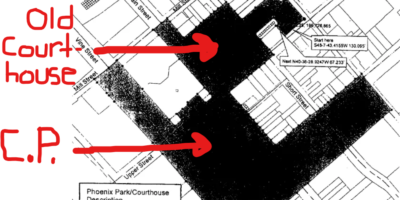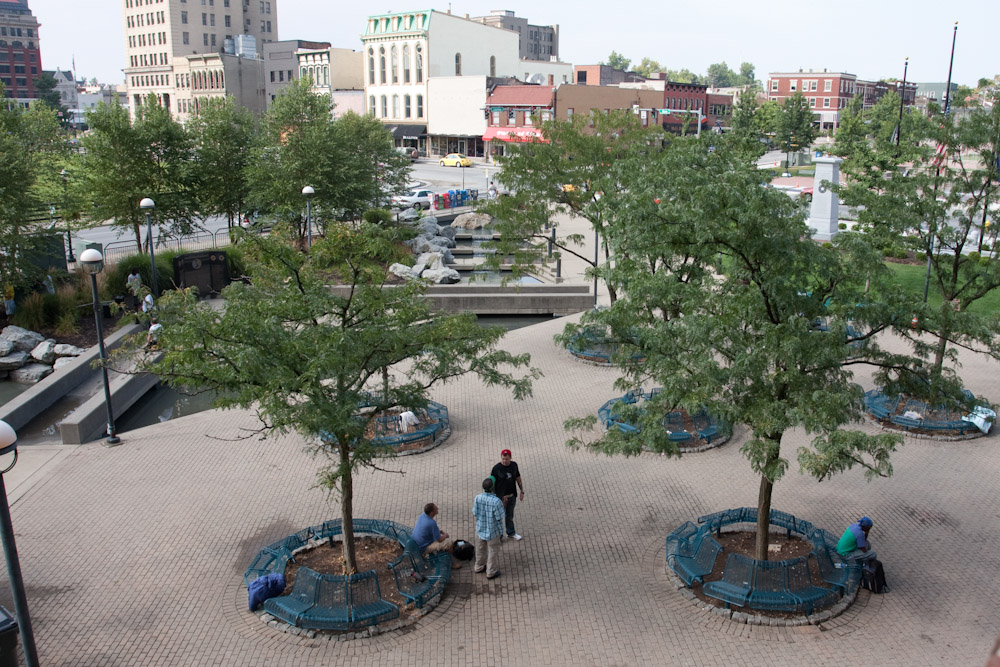Homelessness in our communities
By Jeff Gross
(Editor’s note: This article is part two of Jeff’s series based on his work with and for people experiencing homelessness in Lexington. In his last piece, he introduced the Catholic Action Center and the Street Voice Council.)
On a recent Wednesday afternoon, I was sitting in Phoenix Park, near the downtown public library at the corner of Limestone and Main. I counted 27 people in the park, most of whom were sitting on benches and carrying on private conversations. Two police officers on bicycles talked to each other and watched the park. All-in-all, the park was a clean and quiet environment. Despite its tranquil atmosphere this particular Wednesday, Phoenix Park is an often-contested space in the heart of Lexington.
The homeless and marginally homed, the vast majority of people who inhabit the park on an average workday, see it as a space for community, a safe place where they can get together to make it through the day.
For some downtown business owners, though, these park users are seen as a threat to business.
In the public discussion over the character and purpose of the park, the problem has been that the voices of the homeless and marginally homed have been the most muted in the struggle over the park’s future. Yet, these are the people the most personally affected by decisions made about Phoenix Park.
The DLC’s engagement
The Downtown Lexington Corporation (DLC), in its 22nd year of existence, is funded in small part (less than 13 percent) by LFUCG, but most of its funding comes from business membership and profits from beer sales at various events and festivals. The DLC sponsors a wide range of community events from downtown clean-ups to Thursday Night Live and the upcoming Lexington Fest-of-Ales. Beyond these special events, the DLC is focused on day-to-day life in downtown Lexington. The organization has the stated goals of promoting “diversity, communication and leadership in assisting property owners, businesses, employees and residents in making Downtown Lexington a location for retail businesses, restaurants, offices, arts and cultural activities as well as a wonderful place to live and work.”
I talked to Jessica Gies, Vice President of the DLC and the self-described watchdog of Phoenix Park, about her vision for the park. After walking outside her office building in 2009 and seeing three piles of human feces, Gies decided that the quality of life in the park had to change. Since then, Gies has made it her mission to bring about changes in Phoenix Park, trying to find a middle way between the desires of business owners and the needs of the people who frequent the park. When I asked her if she considered herself an advocate of those experiencing homelessness, Gies responded without hesitation that she was “absolutely” concerned about the welfare of those experiencing homelessness in Lexington. She has been at the forefront of committee meetings to work towards improving Phoenix Park.
In November 2009, the DLC conducted a survey of downtown businesses within a few blocks of Phoenix Park to initiate the process of finding “the best possible solution to the needs of downtown businesses, their patrons and those who make up either the homeless or marginally housed population in downtown Lexington.” Thirty businesses responded to the survey, and 29 of those felt that they were “affected by the homeless or transient population.” Nine of those 30 reported that they were “very affected.”
The most common complaints in the DLC survey were panhandling, littering, and shoplifting. Businesses suggested that this population scared off customers. One responder explained, “Potential customers, especially women, face panhandling, cussing and general harassment when coming from ‘park side.’ Tip Jar has been stolen three times and once someone opened the cash register and tried to steal the cash.” It seems as though most crimes in the area are automatically attributed to the homeless population. For example, one responder complains about the “homeless panhandling our customers inside and outside of restaurant (on our patio). We were burglarized in March, early morning.” The survey reveals a variety of opinions about the homeless, though the vast majority of the business owners’ testimonials suggest that they believe the presence of the homeless negatively impacts downtown businesses.
If there is a middle road between the wants of business owners and the needs of those experiencing homelessness, then Lexington will need to find a creative and progressive solution.
Right now, some business owners seem to have simplistic and perhaps even draconian responses to the following question: “What actions toward a solution would you suggest the community take to address the current situation in the downtown area?” A number of business owners seem to want more police activity, as seen in responses ranging from “Very regular police patrol and presence in the Phoenix Park area. 24/hours/day” to “Officers stationed at Phoenix Park and Courthouse at night. ‘No Hanging Out’ policy. Arrest ALL panhandlers.”
Other business owners did propose alternatives to more policing of the park area. One suggested that we need “better healthcare to deal with mental illnesses” and another several favored approaches to help those experiencing homelessness find the housing, jobs, skills training, education, or social services that they need.
“Clean” rather than “cleanse”
In its efforts to improve the quality of downtown life for all stakeholders, the DLC must find a way to please its primary constituency (downtown businesses) while still meeting the needs of other stakeholders, including citizens of downtown and those persons who are staying in or around Phoenix Park. Gies emphasizes that her goal is to “clean” the park rather than to “cleanse” it. When asked about this distinction, she explained that a “cleansed” Phoenix Park would involve forcing all the homeless out, inevitably displacing them to another public location. An effort to cleanse Phoenix Park of the homeless would not help people experiencing homelessness improve their lives or find the services available to them.
A “clean” park, on the other hand, would ensure that those feeding the homeless are following health department protocol. Gies says that one of her first goals is to ensure that all groups providing food in the park are permitted. She makes it clear that she does not want to criminalize feeding in the park, but she wants all groups to be on the same page. She worries about people who pull up and start distributing sandwiches from the trunks of their cars. If the food isn’t being prepared or stored properly, Gies explains, then it could spread sickness to recipients. A clean Phoenix Park may still be a central hub for the homeless and food distribution during the day, but a clean park may be closed for a few hours each night so that cleaning crews can remove refuse.
Central to the DLC’s ideas for improving downtown life is the formation of a day center. The drop-in center would include a small paid staff and other volunteers and offer a centralized location for those experiencing homelessness to have public restroom access during the day. Furthermore, the center would be a hub of information about social services. This plan has the attention of the mayor’s office and seems to be moving forward.
However, the fact remains that until those experiencing homelessness in Lexington have access to facilities 24 hours a day, there will still be feces in outdoor public locations. Safer food distribution practices will be good, but those persons inhabiting Phoenix Park are not concerned about food. When you ask people what they need, access to restrooms and safe places to sleep are at the top of their lists. One person in Phoenix Park explained to me that it takes away her human dignity when she can’t use a restroom at night.
Community and safety at Phoenix Park
What Phoenix Park offers people experiencing homelessness is a shared sense of community and access to food, clothes, and blankets. Those who stay downtown also appreciate the security it offers, something lost when people are pushed to temporary or semi-permanent camps around the city.
Benjamin Bond, who has lived in Phoenix Park during the summer for around five years, says that the easiest way for the city to clear the homeless out of the center of downtown would be to bring food somewhere else. Where the food is, he says, is where the homeless will congregate. Regardless of where food is distributed, people will still congregate out of a need for community and mutual protection. Bond says that he has chosen to sleep in Phoenix Park because he’d “rather be out there in the open than in some cubby hole where someone will find [him] and knock his brains out” for $4 or $5.
Phoenix Park gives the homeless and the marginally homed a centralized location to meet in a city where many of the services that those experiencing homelessness need are scattered around town. “You have to be a thoroughbred to make it in this town,” says Bond, speaking of the demands placed on the homeless in Lexington. In Phoenix Park, people have quick access to restrooms at the library during the day, the Internet and other information, and an environment where many individuals feel safe.
To coincide with the DLC’s research, the Central Kentucky Housing and Homeless Initiative (CKHHI) also conducted a survey in October 2009. Targeted at all people sitting in the park—those experiencing homelessness and those who may just be there at that moment—for a 90-minute period, this survey explored patrons’ backgrounds and reasons for visiting the park. When asked what they liked about the park, a vast majority said that they liked either the park’s environment (31 percent) or the people and friends they met there (46 percent). Another nine percent suggested that they like the library.
Of the CKHHI survey’s 95 responders, 35 percent said that they were staying in the park overnight. This group would be the most impacted by any decision to close the park for a few hours each night for cleaning. Such a decision would represent an effort to make sure that people could not spend the night in Phoenix Park, and it does not account for where those sleeping in the park would end up. For someone like Bond, being pushed out of the park would put him in a position where he would feel less safe.
The CKHII survey also showed that those residing in the park wanted to be considered stakeholders in the park’s future. When asked what changes would improve the quality of the park, participants in the CKHHI survey favored improved safety and stopping the use of alcohol and drugs in the park. Partly in response to the ongoing discussions about the future of Phoenix Park, the Street Voice Council (SVC) was formed in the fall of 2009. The SVC has offered to help patrol the park. SVC leadership committee member Ellis Boatley has proposed a plan to have members of the homeless community serve as ambassadors in the park. These ambassadors would remind people of the rules and push them to do little things like clean up trash in the park.
As I finish this article, I am staying in a house on Maxwell Street with several persons who were formerly homeless; they are preparing to perform a play about their experiences of homelessness in Lexington. At 3:30 a.m., I sit with Boatley outside while he smokes. In the bushes, just outside, three men are sleeping.
I could ask these men about their stories, and chances are I’d learn something about addiction or under-employment, but I will let them sleep. However, eventually their voices must be heard fully by the community at large: downtown Lexington’s future is also their future.
Jessica Gies of the DLC is excited about “Impact Change,” a project which will convert old parking meters into donation points for the homeless. While the details are still being worked out, the money donated would be granted to qualifying and randomly selected local charitable groups engaged with issues of homelessness.





James Henderson
I was arrested at my home in Florida and brought to Lexington, in chains, for Failure To Pay Child Support. I did not owe child support. I lost my home and my investments due to this “little mistake” made by the courts. My entire inheritance, ($133,000.00) was taken by the court “in case” I owed child support. I found myself living on the streets of Lexington, as the jail kept my cash and credit cards.
I am not the only homeless person that has been imported here by the courts and pillaged in their unmitigated greed.
If Lexington wants to reduce the homeless population, perhaps she should find some competent and/or honest Judges and Attorneys to put into her courtrooms.
mark
james i know this is you , mark up north
hows the copper bizz……… i hope you contact me i have abit of god news for you if you are interested in some work
YA BOY
LATER …MARK